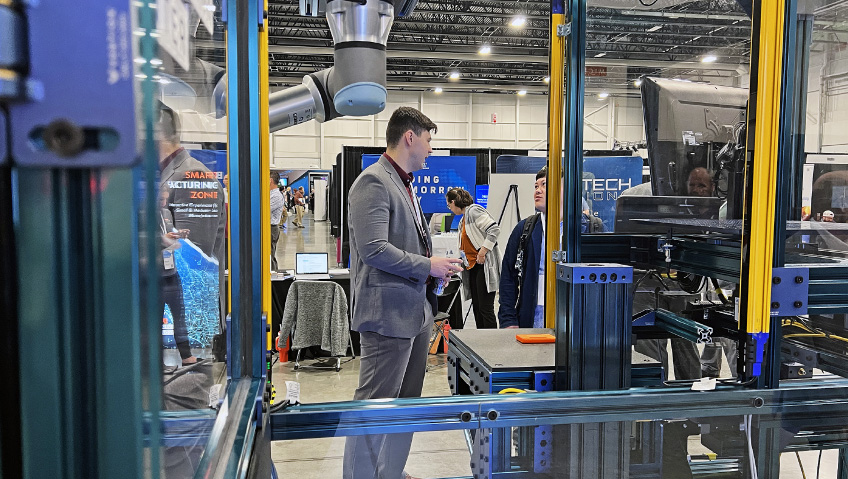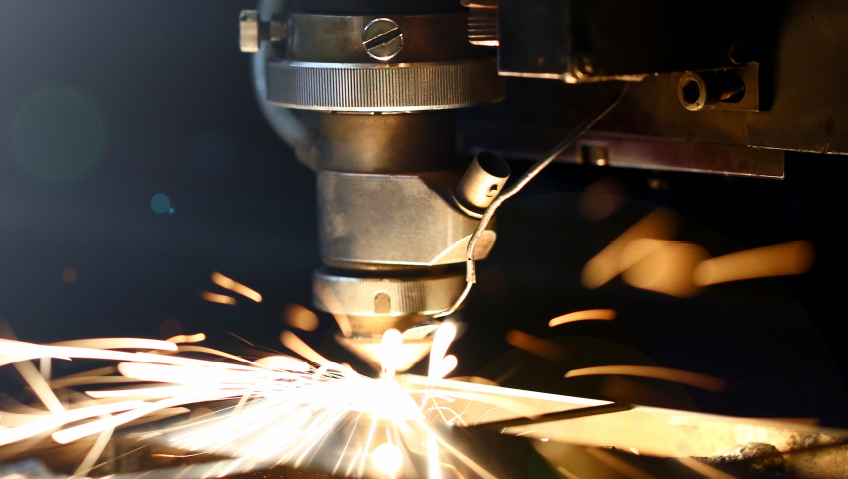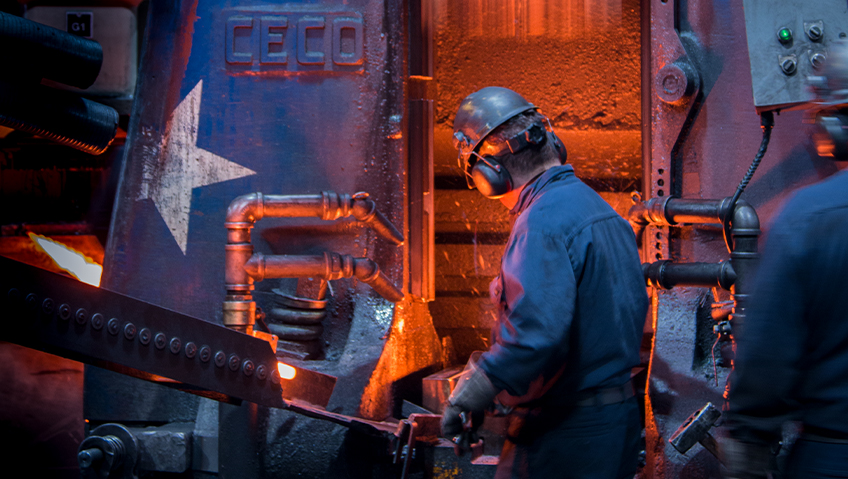The Michigan Manufacturing Technology Center (MMTC) was founded around 32 years ago with the inception of the North American Free Trade Agreement (NAFTA). At that time and into the mid-2000s, there was a growing apprehension regarding the loss of manufacturers and small-to-medium businesses across America. To combat this, a manufacturing extension partnership (MEP) was launched in every U.S. state and Puerto Rico, creating a network of organizations. The MMTC won the bid to become the official MEP for the state of Michigan.
The center is funded with federal and state dollars through the U.S. Department of Commerce. Center President Ingrid Tighe says that, “The MEP network is so important to manufacturing in the U.S. and [the MMTC is] more vital now than ever.”
Today, as Vice President of Business Development and Strategy, Jim Gorman says, the center’s role is to lend its expertise to Michigan companies that may not be familiar with manufacturing and all that it entails and find affordable ways to introduce them to the wider world of that market.
The center has seen a great many success stories in its time, which began with its work in costing measures. MMTC helped businesses draw a line between business performance and cost performance using a ‘transformation planner,’ which gave way to modules on core team training, small business training, and helping small-to-medium-sized businesses enact a financial plan.
Currently, Manager of Operational Excellence, Chuck Werner, says that three of the center’s main pillars in helping Michigan-area businesses are technology adoption, workforce, and supply chain. The first has to do with addressing the ongoing workforce shortages in businesses, by helping companies in need adopt machining and technology solutions, including those within Industry 4.0, and teaching them how to implement these solutions.
Second, the center helps these companies with gaining and retaining their workforce. Finally, it educates businesses on how to build and pivot into different supply chains—for example, automotive manufacturers moving from internal combustion engine-powered vehicles to electric vehicles.
Werner says that businesses, business owners, and business leaders in Michigan do not always have time to enact strategic or continuous improvement in their businesses, which is where MMTC comes in. Center employees like Manufacturing Services Manager Bob Scipione help small-to-middle-sized manufacturers select and apply technologies based on the needs of the business. This has helped many machine/computer numerical control (CNC) shops and community colleges in Michigan push further toward initiatives like automation.
The center is also concerned with supply chain matchmaking and curates an extensive database where companies can inquire about help for producing a certain device or service. The center can identify a match and connect companies in industries like defense, aerospace, automotive, and more to do business together.
Tighe says that there is a national push on supply chains regarding matchmaking and identifying gaps nationally and locally. MMTC also facilitates grant opportunities for state businesses, such as the GoingPRO Talent Fund, which allows businesses two annual opportunities to gain up to $2000 per employee for use toward training or services; or the GEM (Global Epicenter of Mobility) grant, which helps companies pivot and find new opportunities in diverse areas.
The center continues to be aided in these efforts through its many partnerships. For example, MMTC allied recently with MEDC (Michigan Economic Development Corporation), Lawrence Technological University, and the non-profit Automation Alley to establish a grant that would help data gathering on technologies needed in the state. Research determined that local businesses lacked funding and planning, so the partnership determined a five-year plan along with a grant to conduct fund-matching for companies.
These partner organizations also act as trusted advisors to clients, helping them find the right technology and supplier. Tighe says that MMTC is very strategic about its partnerships and views its partners as multipliers. “We cannot be everywhere at all times, so these organizations can be an extension of our services… they will refer us to customers in need and vice versa.”
The center is concerned about working with its partners as well as with the state of Michigan to strengthen supply chains. This work is currently in the inquiry stage, as MMTC completes research to identify the current landscape and bring back data at all levels to strengthen supply chains. Examples of this work include helping a Michigan company that specialized in computer modeling and simulation convert a carriage house into a machine shop and a new plant. Another example is a prominent keyboard company, for which MMTC has completed a technology assessment and connected it to Industry 4.0, securing it an implementation grant as well as a pick-and-place machine. Gorman says that it is exciting to play even a supporting role in work like this.
Members of MMTC say that Michigan is amid an industrial revolution of sorts, with Industry 4.0 at the forefront. Many of the technologies associated with the movement have been around for decades but were previously cost-prohibitive and needed a great deal of technological knowledge to implement correctly; today, these technologies are easier to use than ever and are more accessible.
To make this happen, the center performed an assessment in the mid-2010s to measure business opportunities and needs, as well as using its laboratories and factory area to help business owners get their hands on this new technology. It also physically transports the technology around Michigan to allow these opportunities to continue through roadshows. It further developed an education curriculum to teach small-to-medium manufacturers about this technology, how to leverage it, and how to develop it over time.
Scipione says that part of the center’s funding comes through MEDC, which funds its Industry 4.0 team to perform a variety of activities, such as technology assessments. “Industry 4.0 shines with cost, is easy to implement, and [is accessible],” he says. A lot of manufacturers still think that the technology is only for big business and may not realize how approachable and affordable it is now, and with automation now at a fraction of its original cost, if a business does not adopt it, a competitor will.
Werner says that now is the time for businesses to start looking at affordable technology within Industry 4.0, including emerging tools like artificial intelligence that are developing quickly and presenting new opportunities. However, workforce issues in the state will not go away so easily, so some companies may need to figure out how to run a business with the availability of staffing being what it is—which is where automation can come in.
Werner says that cloud-based platforms and big data information systems are also key trends currently, allowing smaller manufacturers to pay a nominal subscription fee for access to a robust operating system for their plant. Digital work instructions also represent a big opportunity and are beginning to overtake traditional, paper-based methods in favor of videos and tablets. These ways are being heavily adopted by newer generations, so digital solutions will be needed to properly prepare people for the job.
The future will see MMTC work on further technology adoption and offer classes on topics including change management. Werner says that everything the center does involves change, whether it’s embracing new equipment or hiring new people; however, successful change must be managed and guided.
To this end, the center will be partnering with educational institutions and local economic development organizations to shake up its roadshows, as well as to bring those looking for employment into the same venue as those looking to adopt technology. This will, in turn, help younger, more technology-literate people match up with available jobs that need greater technological expertise.
“We are here for manufacturers; we are their trusted advisor and we make sure [they] have what they need,” Tighe says, noting that manufacturing is a dynamic industry in which technology is growing and changing exponentially. It is more vital than ever, she says, for MMTC and its organizations to work with companies to help them become more aware and educated so they can keep up with this evolution, as well as continually grow and expand.
Gorman says that Michigan, as a state, has more to offer than people realize and is constantly revitalizing itself beyond the industrial landscape of its reputation. Surrounded by abundant natural resources, associations like MMTC are soliciting electrical and computer science professionals to come and work in Michigan alongside the resilient people who call it home.
The work it does is not just about returning shareholder value for a profit, but to take the experience of all those who work within it and help other businesses to learn and grow. As Gorman says, “What else would I rather do than this kind of work?”






